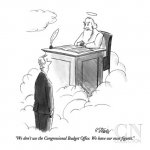The CBO is widely respected.
>>it explains on the second page that the cost per patient doesn't include payments for veterans who get government paid health care in the private sector. They say that represents 70% of those registered with the VA. In other words, VA is cheaper because they only count the cost of health care for 30% of the vets.
No, that too is incorrect. Page 4 does include the following:
Veterans who are enrolled in the VHA system receive most of their health care outside that system — typically about 70 percent, according to information provided by VHA. As a result, VHA’s average cost per enrollee understates the full annual cost of a veteran’s health care.
That is part of a section in which the report lists, in great detail, the difficulties involved in comparing the two delivery systems. Yer statement about "only count[ing] the cost of health care for 30% of the vets" is clumsy and completely unwarranted.
Yer objection here is similar to yer earlier claim that "[t]he source for the first article you liked was VA doctor." Care to provide a page reference to back up that falsehood?
>>I believe little of what the government says and for good reason.
You pick and choose what you believe based on yer rather extreme ideological bias.

